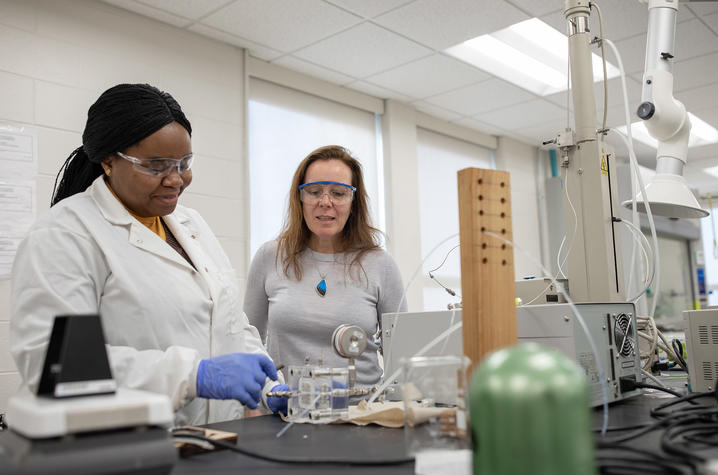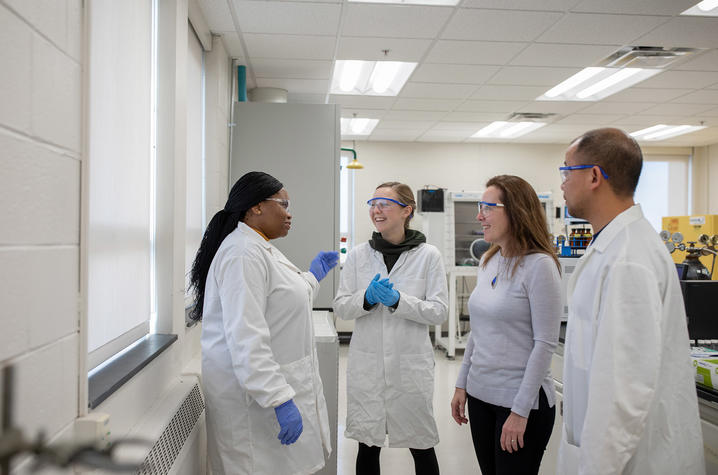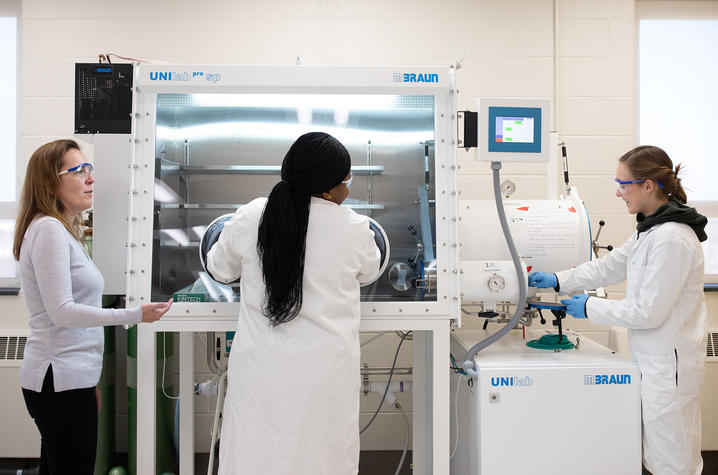‘We are a Family Here.’ How This UK Professor is Reimagining Virtual Learning, Student Support
LEXINGTON, Ky. (Jan. 28, 2021) — Life is a balancing act, just ask Isabel Escobar. As a woman with many titles — educator, engineer, researcher and dedicated mother — time is a valuable resource.
And since March of last year, there’s been less of it.
“In the spring, my home situation changed significantly,” Escobar said. “My 5-year-old, now in kindergarten, started doing virtual learning.”
As schools across the country shifted to remote learning, Escobar wasn’t just responsible for managing her daughter’s education. As a professor in the Department of Chemical Engineering at the University of Kentucky, she also had college students looking to her for guidance.
“I quickly pivoted to deliver the remainder of my spring courses online.”
And that was no easy feat.
From teaching her daughter the ABCs to giving undergraduate students lessons on thermodynamics, Escobar transitioned her Lexington home into the ultimate classroom.
“As a rule of thumb, I like my classes to be interactive. And the week before Spring Break, several students stopped by my office to ask me to have classes live so they would feel more engaged — they were afraid of being overwhelmed with material.”
As one might expect, Escobar’s two courses — Chemical Engineering Thermodynamics and Introduction to Research — are typically hands on.
“The introduction course involves learning how to perform research. Experiments are often performed in class, so that students can see the importance of replication in data,” she explained. “Sending them a pre-solved problem or a video of me solving a problem, bypasses that initial ‘let’s look at the question and determine what your first step should be.’”
But without a lab, Escobar had a problem of her own. True to her engineering background, she solved it by getting creative.
Escobar reimagined the experiments, so students could perform them using everyday household items — a measuring cup, paper clips, a rubber band, a Ziploc bag and water.
“I had them bring these materials to live virtual class meetings, and we determined the effect of increasing weight (different measured amounts of water in the Ziploc bag) on the rubber band elongation measured with the ruler,” she said.
“Professor Escobar is a very passionate instructor for fluid mechanics and was able to effectively deliver that real-world content to students in a hybrid course format in the fall semester, while being regularly available to answer student questions regarding coursework and other facets of college life during these abnormal times,” Trey Mesta, a civil engineering student, said.
Throughout her time at UK, Escobar has strived to be a mentor — someone who provides support when it’s needed most. Despite personal challenges brought on by the COVID-19 pandemic, she has remained dedicated to the well-being of her students.
For instance, last year, Escobar required each of her students to schedule at least two individual 10-minute meetings. She wanted to provide them with a safe space to discuss any concerns. But what seems like a simple gesture added 740 minutes — more than 12 hours — to Escobar’s already time-consuming workload.
When asked why she made the meetings a priority, Escobar responded, “I counter that question with another: how could I not? As an educator, my primary goal is student learning — not their grades, but their understanding of the material. And it helped me check in on their emotional state. Many students talked to me about depression coming from isolation, about not having good places to stay (with respect to Wi-Fi, safety, work …). I found it to be an important connection that kept them from giving up/failing.”
“Not only has Professor Escobar been an awesome professor, but she is also a fantastic mentor. It would be impossible to count all the ways she has helped me,” Aissatou Diop, a chemical engineering student, said. “She opened my eyes to new stages of opportunities and strength. I’m incredibly grateful that she took me under her wing when I first started on my research journey.”
As a former international student, Escobar understands the importance of developing a support system that genuinely cares about you. “My parents sacrificed so much for me to be able to attend college in the United States, and I know many families go through the same sacrifices. It is my duty to be my best educator-self for them.”
It's a Tuesday and Escobar is giving a lesson via Zoom, that is, until her daughter bursts in with a lollipop and a question, “Mom, do you teach at Monster’s University?” she asked.
Escobar chuckles, introduces her to the class and carries on. She has learned to embrace the organized chaos, because Escobar has two families and both of them matter.
“We are a student-focused university. UK values student learning and student growth,” she said. “My students are my children, and I see myself as their university mom. We really are a family here.”
As the state’s flagship, land-grant institution, the University of Kentucky exists to advance the Commonwealth. We do that by preparing the next generation of leaders — placing students at the heart of everything we do — and transforming the lives of Kentuckians through education, research and creative work, service and health care. We pride ourselves on being a catalyst for breakthroughs and a force for healing, a place where ingenuity unfolds. It's all made possible by our people — visionaries, disruptors and pioneers — who make up 200 academic programs, a $476.5 million research and development enterprise and a world-class medical center, all on one campus.







